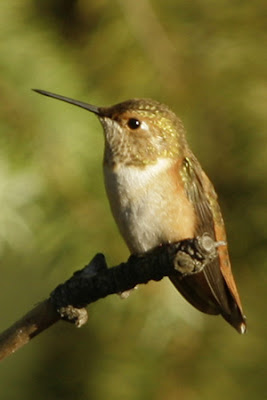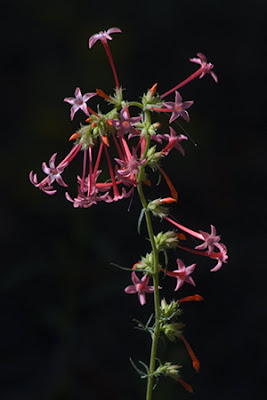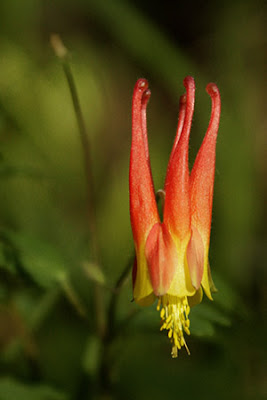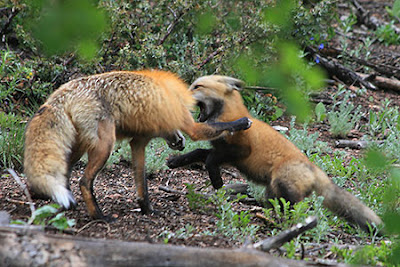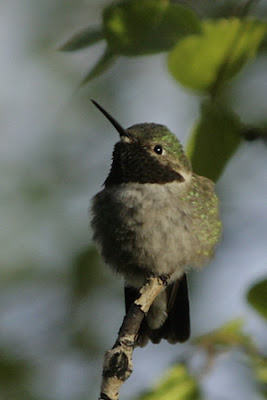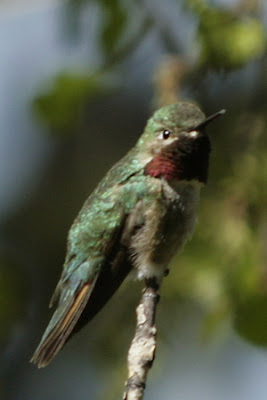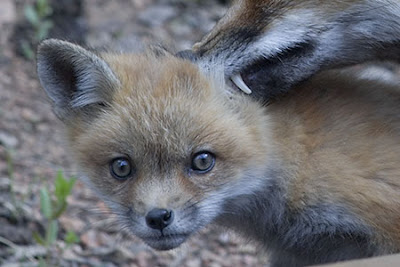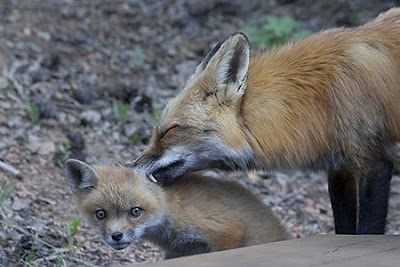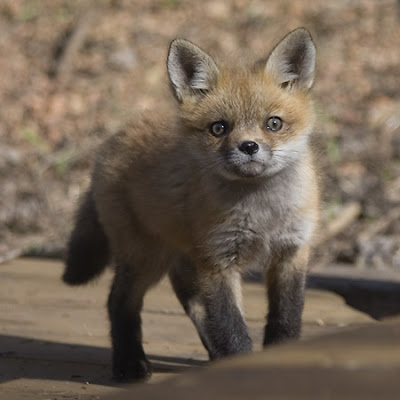wapiti
South Park – I watched a large herd of about 100 wapiti (American Elk) jump fences and cross a road toward a small lake. One of the babies couldn’t cross the fence. The whole herd stopped and called out encouragement, but still the baby could not make the leap required to cross the fence. Very slowly, the entire herd turned around and crossed back over the fences and road to join the baby. Then, they began running in the opposite direction stretching out in a long line silhouetted against the distant hills. At times like this, I wish for a 600mm lens. Here are a few images at 300mm.
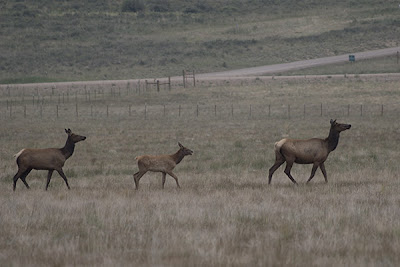
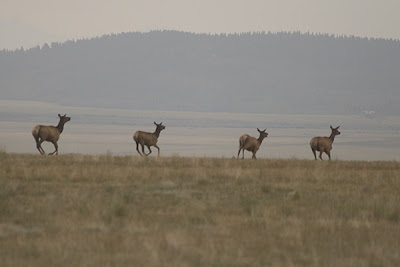
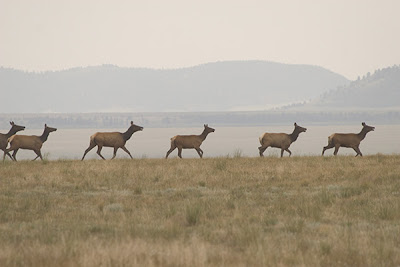
Grizzly Bears!
I’ve been looking at bears this evening on a friend’s blog, AK07. John is living with a bunch of bears in Alaska this year and working for the park service. Great photos!
the golden gate

Wild About Wildflowers
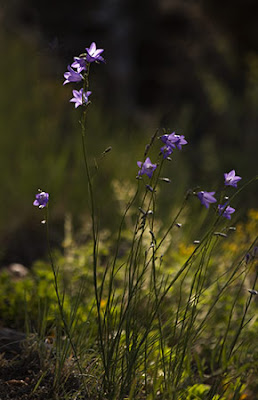
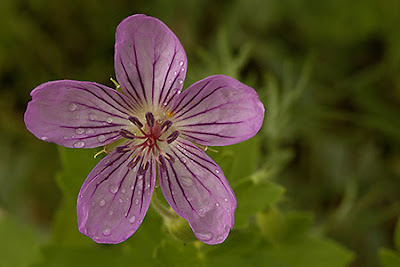
Wild Geranium
1/125 second @ f/8, 60mm, ISO 400
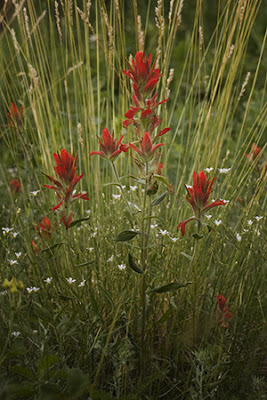
1/125 second @ f/8, 60mm, ISO 400
Here Comes Trouble…
Let the hummer wars begin.
Rufous is here now guarding the flowers and feeders and chasing all others away. The broadtails are sneaking in to the feeder when they can for a quick sip and early this morning before there was enough light for photographing it, a male calliope hummingbird was here for a drink.
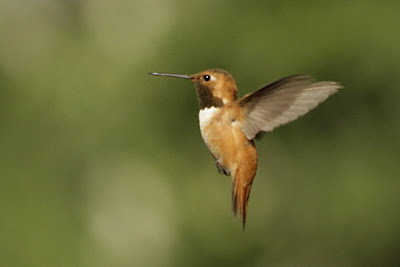 Rufous sits on the tip of a dead douglas fir branch to keep an eye out for intruders. He doesn’t seem to know that he’s the intruder here. The broadtails arrived months ago.
Rufous sits on the tip of a dead douglas fir branch to keep an eye out for intruders. He doesn’t seem to know that he’s the intruder here. The broadtails arrived months ago.
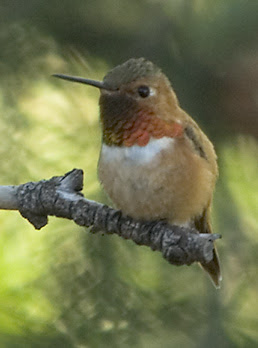 Rufous is like the grade school bully who thinks he has to make up for his small size by being faster and meaner than everyone else. For those of you who haven’t met rufous, you can see how small he is in the image below where he sits on a feeder with a 5 inch tall bottle.
Rufous is like the grade school bully who thinks he has to make up for his small size by being faster and meaner than everyone else. For those of you who haven’t met rufous, you can see how small he is in the image below where he sits on a feeder with a 5 inch tall bottle.
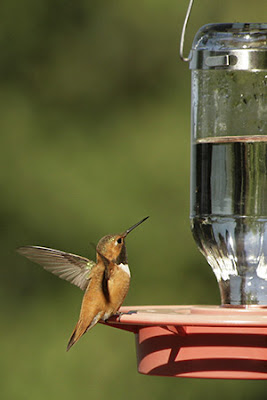 Rufous will stay for about a month and then he will move on. He’s already ‘summered’ in the north and will continue his southward migration sometime next month. Rufous hummingbirds nest as far north as southern Alaska and winter in Mexico. They travel northward in spring through the pacific lowlands and make the return trip mid summer through the Rockies to take advantage of peak wildflower times.
Rufous will stay for about a month and then he will move on. He’s already ‘summered’ in the north and will continue his southward migration sometime next month. Rufous hummingbirds nest as far north as southern Alaska and winter in Mexico. They travel northward in spring through the pacific lowlands and make the return trip mid summer through the Rockies to take advantage of peak wildflower times.
The male rufous’ gorget (the iridescent throat patch) reflects bright orange-red when light hits the feathers. The feathers of the gorget direct light in a single direction so that the color seems to change from dull brown-red to bright orange-red as the bird flies about.
Rufous is a little harder than the broadtails to photograph on the wing. I need bright sunlight so I can get my shutter speed quite high. My most popular rufous image can be seen here.
Wildlife in Como
the red columbine
fox kits update
The black legged kit is also in the 3rd image play fighting with the mother. There was a lot of this going on that morning, but the action was mostly behind the trees and I was only able to catch glimpses of it. Here, the kit with ears layed back goes after the mother’s neck while her open mouth moves toward the kit’s leg. I suppose a good mother must teach her children to defend themselves. Image captured at 1/200 second at f/7.1, focal lenth 300mm and ISO 400.
favorite perch
The broadtails are fighting over favorite perches near the currant bushes loaded with tiny pink flowers. They like perches with a 360 degree view so they can see the competition coming. Sitting on the tip of a dead branch, the hummingbird looks left, right, and back twisting and turning his head above late May’s food of choice – the wild wax currant flowers. Though they perch elsewhere, this little upward pointing twig is the spot they most often choose. The first image was taken last evening in the after glow of sunset. The next one, this morning, same place but from a slightly different angle to take advantage of the morning light.
1/640 sec at f/5.6, ISO 400, focal length 300mm
1/640 sec at f/5.6, ISO 200, focal length 300mm
For a look at a broadtail feeding on a currant flower, go to this page of my website: http://www.dailyphotography.net/hummingbird_gallery/pages/natural_food.htm
Looking for more fox kit photos? A new gallery of fox kit photos is on my website now. http://www.dailyphotography.net/redfoxgallery/index.htm
grooming
Tippy
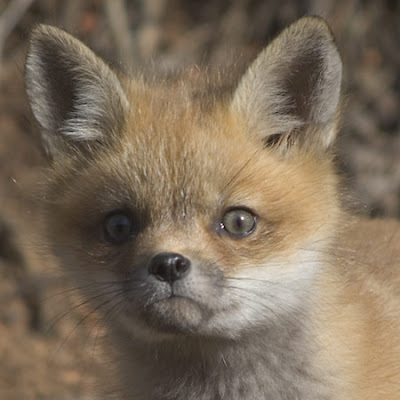
1/640 sec at f/5.6, ISO 200, focal length 300mm, cropped
Here’s Tippy, the runt of the litter of fox kits born under my friends’ back porch. Watching through the windows as the three kits play, this little one has captured my friends’ hearts and earned a name. He limps a bit, has a crooked nose, and shorter snout. Though he’s the much loved favorite of the people who watch from the house, I have waited to introduce him here. I wanted to make sure he was going to survive, didn’t want to have to post that he’d disappeared. Tippy caught a small bird resting on a low branch of a shrub a few days ago as I photographed the mother fox and her kits. He’s been seen with a mouse in his mouth and is running, hunting, and playing with the others, so it’s time to introduce him. Be assured, we do not feed these foxes. If we fed them, they might stop hunting and come to depend upon us. If we feed Tippy, he won’t learn to hunt and survive. We watch them and they watch us from a comfortable distance.
